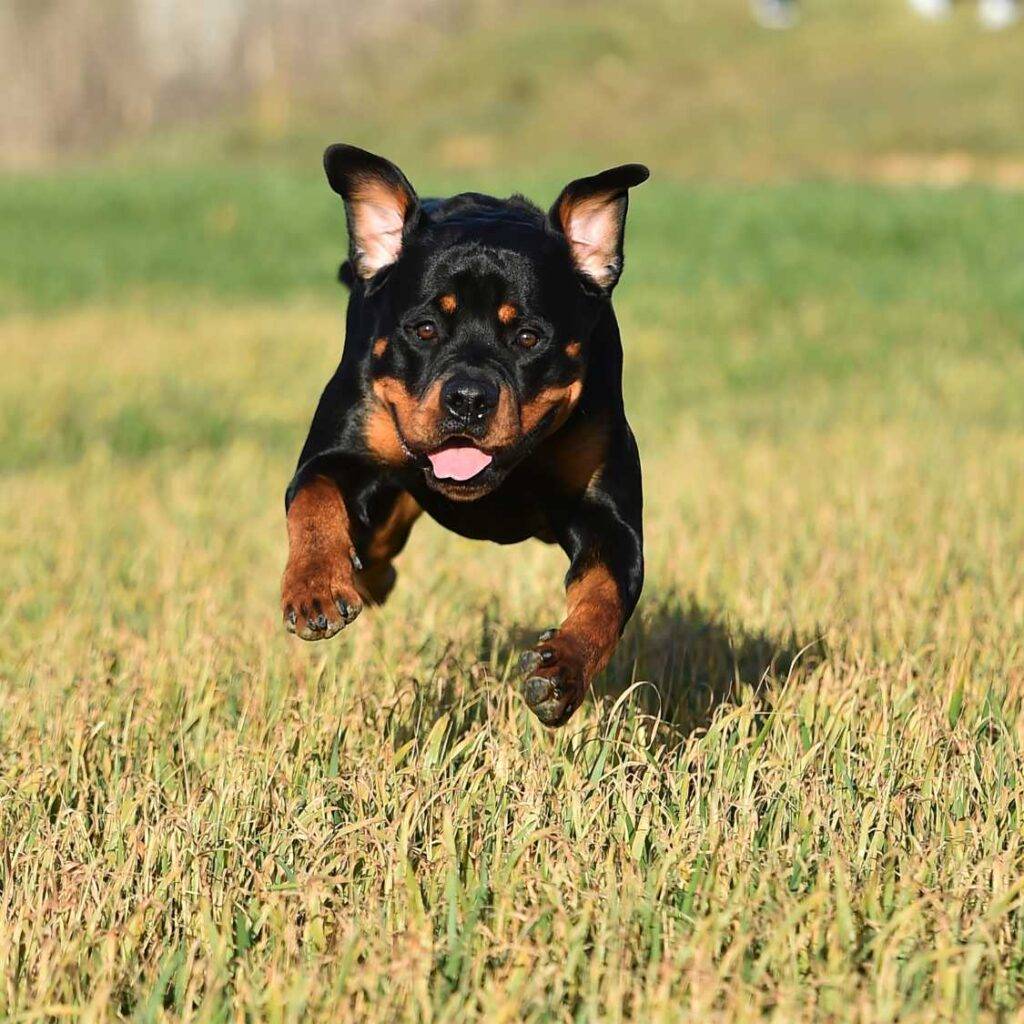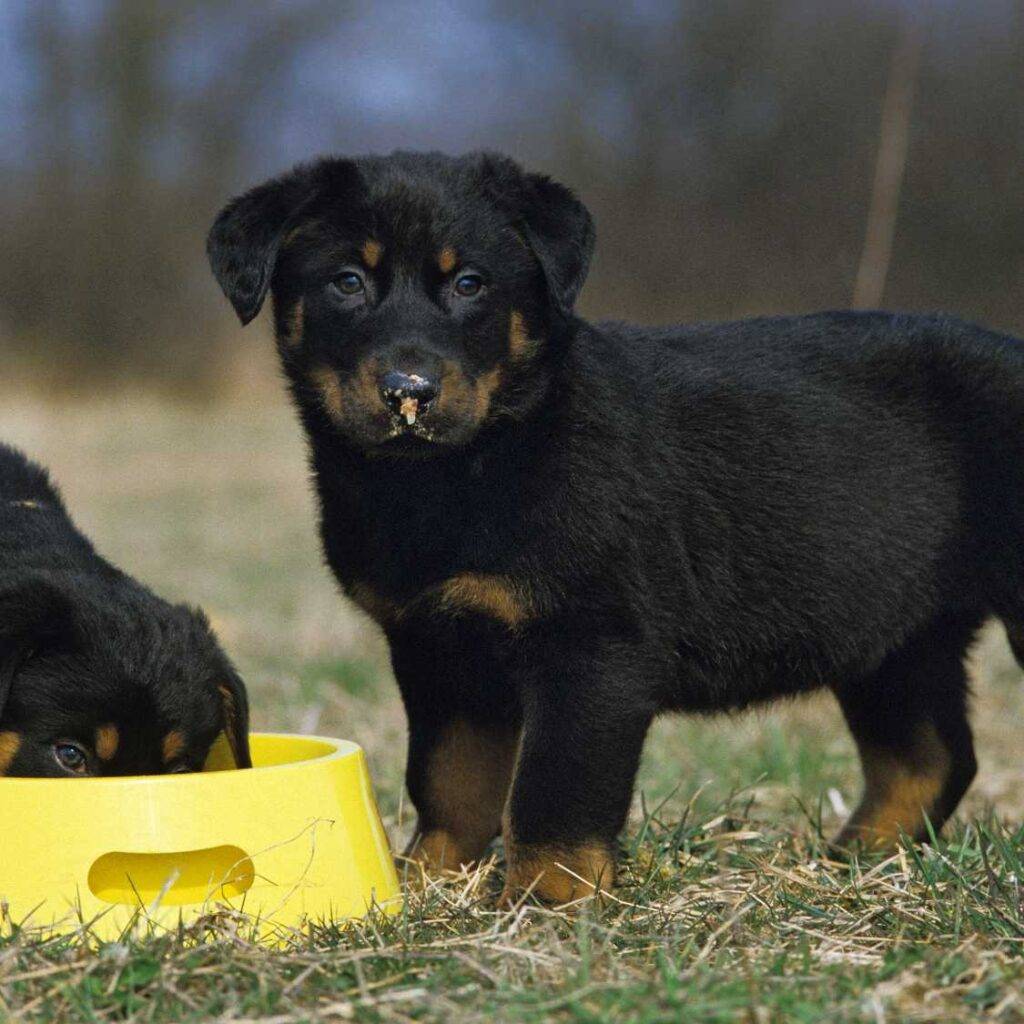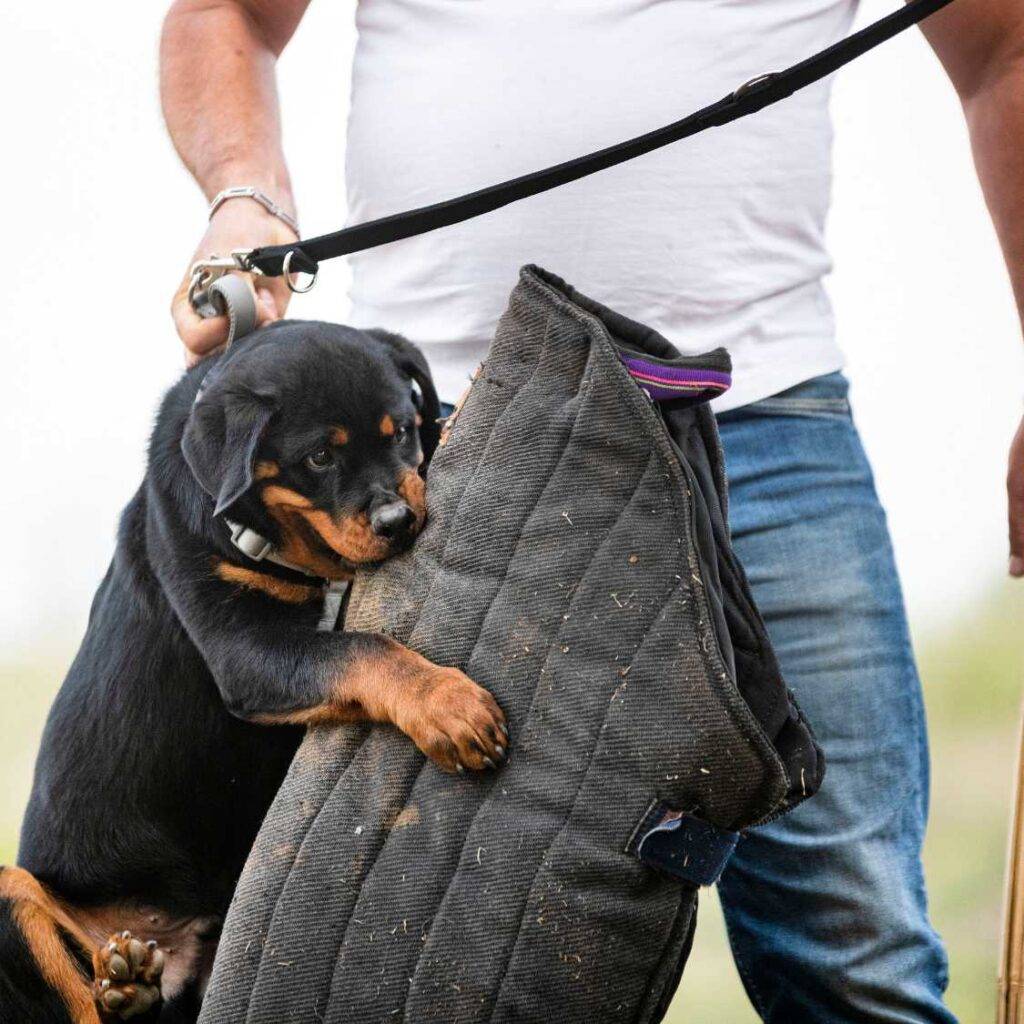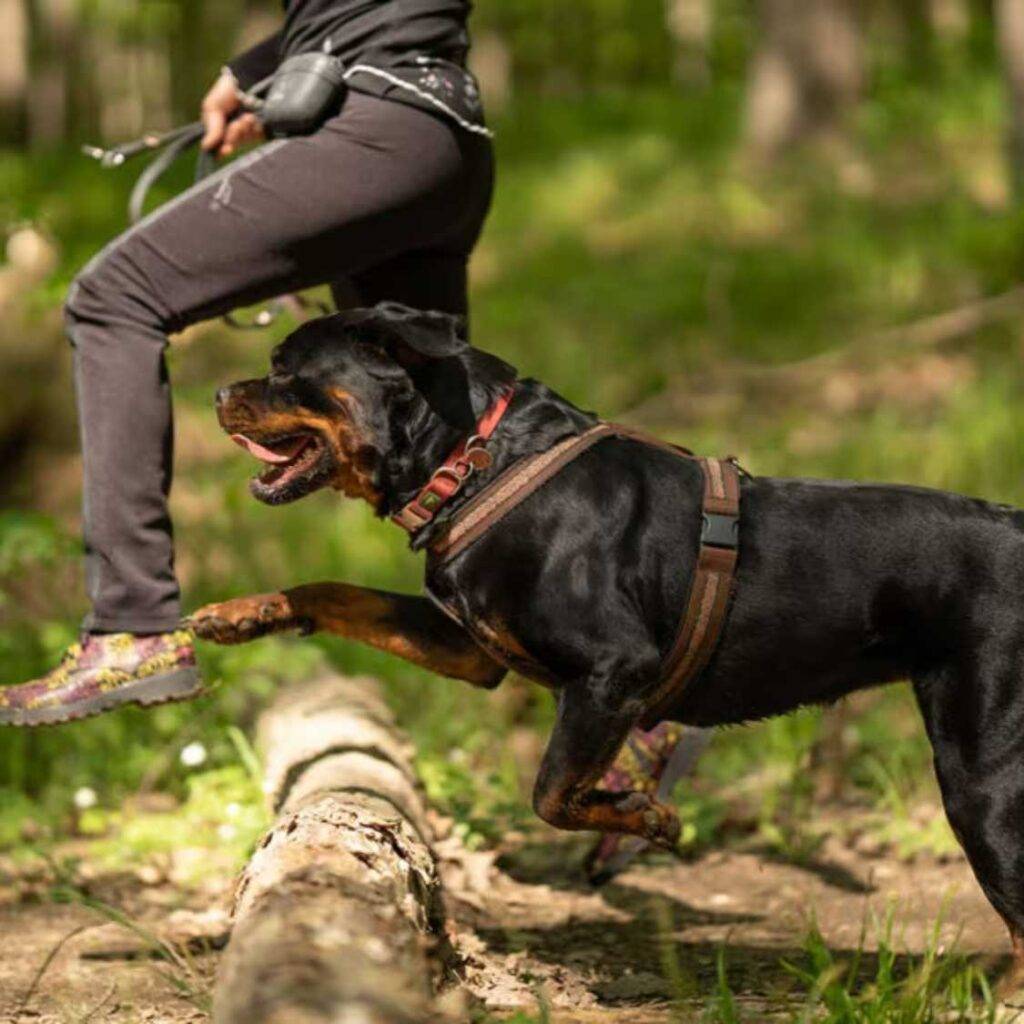Rottweilers are powerful, loyal, and intelligent dogs that make excellent family pets and reliable working dogs. Whether you’re considering adding a Rottweiler to your family or already have one, this comprehensive guide covers everything you need to know. From their rich history and distinctive physical traits to their dietary needs and suitability for families, this guide ensures a happy, healthy life for your Rottweiler.
Rich History: From Ancient Rome to Modern Times

The Rottweiler’s origins trace back to the Roman Empire, where they were used as herding and guard dogs. As the Roman legions traveled, these dogs helped drive cattle and protect the soldiers. In the town of Rottweil, Germany, they were further refined and became known as “Rottweiler Metzgerhund” or Rottweil butchers’ dogs. They were used to pull carts and guard livestock. Recognized by the American Kennel Club (AKC) in 1931, Rottweilers today are valued for their versatility, serving in roles such as police and military dogs, search and rescue dogs, and loyal companions.
Physical Characteristics: A Formidable Yet Graceful Presence

Rottweilers are large and robust dogs with a powerful build. Males typically weigh between 95 and 135 pounds and stand 24 to 27 inches tall, while females weigh 80 to 100 pounds and stand 22 to 25 inches tall. They have a short, dense black coat with distinctive rust or mahogany markings. Their broad head, strong jaws, and muscular body give them a commanding presence. Despite their imposing appearance, Rottweilers move with a confident, almost graceful gait.
Personality and Temperament: Loyal Guardians and Loving Companions

Rottweilers are known for their loyalty, intelligence, and protective nature. They are confident and fearless, making them excellent guard dogs. At the same time, they are affectionate and playful with their families. Early socialization and training are crucial to ensure they grow into well-balanced dogs. They are naturally aloof with strangers but are not aggressive without cause. Rottweilers are eager to work and please, which makes them highly trainable, but they require an experienced owner who can provide firm and consistent guidance.
Health and Longevity: Caring for Your Rottweiler

Rottweilers are generally healthy dogs, but they are predisposed to certain health issues. Regular veterinary check-ups and a healthy lifestyle are essential to manage these risks. Common health concerns include:
- Hip and Elbow Dysplasia: Genetic conditions that can lead to arthritis and mobility issues.
- Aortic Stenosis: A heart condition that can cause fatigue and fainting.
- Osteosarcoma: A type of bone cancer that is more prevalent in large breeds.
- Progressive Retinal Atrophy (PRA): An eye condition that can lead to blindness.
- Bloat (Gastric Dilatation-Volvulus): A serious condition where the stomach twists, requiring immediate veterinary attention.
Regular exercise, a balanced diet, and maintaining a healthy weight can help prevent many of these issues.
Diet and Nutrition: Feeding Your Rottweiler

Rottweilers need a diet rich in protein to support their muscular build and energy levels. Puppies should be fed high-quality puppy food that supports their rapid growth, typically three times a day until they are six months old. Adults should be fed twice daily, with a diet that includes high-quality protein, fats, and carbohydrates. Portion control is important to prevent obesity, which can exacerbate joint and heart problems. Avoid feeding them table scraps and be cautious with treats to maintain a balanced diet.
Exercise and Activity: Keeping Them Fit and Happy

Rottweilers are active dogs that require regular exercise to stay healthy and happy. They enjoy activities that engage both their mind and body. Daily walks, playtime, and mental stimulation exercises are essential. Aim for at least an hour of exercise each day. They excel in various dog sports, such as obedience, agility, and herding trials. Providing them with a job or task can help satisfy their working dog instincts and prevent boredom-related behaviors.
Grooming: Maintaining Their Sleek Appearance

Rottweilers have a short, dense coat that is relatively low-maintenance. Weekly brushing is usually sufficient to keep their coat healthy and reduce shedding. During shedding seasons, more frequent brushing may be needed. Regular grooming also includes:
- Bathing: Only as needed, using a mild dog shampoo.
- Nail Trimming: Regular trimming to prevent overgrowth and discomfort.
- Ear Cleaning: Routine checks and cleaning to prevent infections.
- Dental Care: Regular brushing and dental chews to maintain oral health.
Living Conditions: Creating a Suitable Environment

Rottweilers are adaptable and can live comfortably in various environments, from apartments to homes with large yards. They thrive best in homes where they can stay close to their family, as they can develop separation anxiety if left alone for long periods. A securely fenced yard is ideal for allowing them to explore and play safely. They are indoor dogs and should not be left outside for extended periods.
Family Dynamics: Rottweilers and Children

Rottweilers can be excellent family dogs when properly trained and socialized. They are generally gentle and protective with children. However, due to their size and strength, interactions with young children should always be supervised to prevent accidental injuries. Teaching children how to interact with dogs respectfully is crucial to fostering a positive relationship.
Training and Socialization: Essential for a Well-Behaved Rottweiler

Training and socialization are critical for Rottweilers. They are intelligent and eager to please but require a confident and consistent handler. Positive reinforcement techniques work best, focusing on rewarding good behavior. Early socialization helps them become well-adjusted adults who are comfortable in various situations and with different people and animals. Basic obedience training should include commands such as sit, stay, come, and heel. Advanced training and dog sports can provide additional mental and physical stimulation.
Working Roles: Beyond the Family Pet

Rottweilers are versatile working dogs and excel in various roles due to their intelligence, strength, and trainability. Common working roles for Rottweilers include:
- Police and Military Dogs: Used for protection, tracking, and detection tasks.
- Search and Rescue Dogs: Their keen sense of smell and determination make them valuable in locating missing persons.
- Service Dogs: Assisting individuals with disabilities, such as mobility support.
- Therapy Dogs: Offering comfort and support in hospitals, nursing homes, and schools.
Their dedication and work ethic highlight the breed’s exceptional abilities beyond being family pets.
Rottweilers Fun Facts and Trivia: Did You Know?

- Rottweiler Ranks: Rottweilers consistently rank among the top 10 most popular dog breeds in the United States.
- Ancient Roots: They are one of the oldest herding breeds, with ancestors dating back to Roman times.
- Famous Rottweilers: Many celebrities, including Will Smith and Bruno Mars, have Rottweilers as pets.
Rottweilers’ blend of loyalty, intelligence, and versatility makes them stand out among dog breeds.
Conclusion
Rottweilers are remarkable dogs that bring loyalty, protection, and joy to any household. By understanding their unique needs and characteristics, you can ensure a fulfilling and happy life for your Rottweiler. Whether as a devoted family member, a skilled working dog, or a loyal companion, Rottweilers enrich our lives with their unwavering dedication and love.
Frequently Asked Questions About Rottweilers
Is a Rottweiler a good family dog?
Yes, Rottweilers can be excellent family dogs. They are loyal, protective, and affectionate with their families. Proper training and socialization from a young age are crucial to ensure they are well-behaved and comfortable around children and other pets.
What are Rottweilers’ weaknesses?
Rottweilers can be prone to certain health issues, such as hip and elbow dysplasia, heart problems like aortic stenosis, and certain cancers. They can also be stubborn and strong-willed, requiring consistent training and a confident owner. Additionally, without proper socialization, they can become territorial or overly protective.
Are Rottweilers safe for kids?
Rottweilers can be very safe and loving with children when properly trained and socialized. Their protective nature often makes them excellent guardians. However, due to their size and strength, it is important to supervise interactions with young children to prevent accidental injuries.
What do Rottweilers eat?
Rottweilers require a balanced diet rich in high-quality protein, fats, and carbohydrates to support their muscular build and energy levels. Puppies should be fed specially formulated puppy food three times a day, while adults should be fed twice daily. Portion control and avoiding overfeeding are essential to prevent obesity and related health issues.
Is a Rottweiler expensive?
The cost of purchasing a Rottweiler in India can vary widely, typically ranging from ₹25,000 to ₹75,000, depending on the breeder and the dog’s lineage. Additionally, Rottweilers can be expensive to maintain due to their size, which results in higher food and medical costs. Regular veterinary care, training, and high-quality food are ongoing expenses to consider.








